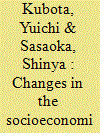| Srl | Item |
| 1 |
ID:
138100


|
|
|
|
|
| Summary/Abstract |
Why do citizens support democracy under an authoritarian regime that has been waging a protracted civil war? This paper explores the attitude toward democracy expressed by urbanites who were protected by the incumbent, by employing the AsiaBarometer survey data collected during the Nepali civil war. Our empirical finding is that citizens’ favorable attitude toward democracy is fostered by economic downturn and deterioration in security. In Nepal, civil war weakened relations between the capital’s residents and rural peasants as the rebels extended their influence in the countryside and shrank the urban economic sectors. Rebel infiltration into Kathmandu furthermore posed a great threat to the residents.
|
|
|
|
|
|
|
|
|
|
|
|
|
|
|
|
| 2 |
ID:
160744


|
|
|
|
|
| Summary/Abstract |
While previous studies focus most of their attention on the impact of civil-war violence on postwar norms of interpersonal trustworthiness, they overlook the importance of political actors' nonviolent interference in civic life during such conflicts. This paper investigates the relationship between wartime provision of public services and postwar trustworthiness norms among civilians. Using original survey data collected from Sri Lanka, empirical analysis suggests that postwar norms of interpersonal trustworthiness tend to weaken if individuals experienced higher amounts of service provision by the Liberation Tigers of Tamil Eelam. To build their own apparatus to provide efficient services, the rebels deeply intervened in and altered local institutions. Such transformation of local institutions dissolves existing social groups and associations that previously tied residents together. Efforts of post-civil-war community development would be ill equipped if these institutions were treated as nonexistent. Postwar development programs need to provide new, effective local institutions to replace those established in wartime.
|
|
|
|
|
|
|
|
|
|
|
|
|
|
|
|
| 3 |
ID:
190881


|
|
|
|
|
| Summary/Abstract |
It is common during a civil war that a government’s counterinsurgency operations result in internally displaced persons seeking refuge from the violence by leaving their communities. However, many civilians alternatively choose to stay in their homes and seek accommodation from the rebels. It is, therefore, puzzling that in a civil war situation when rebel cadres often cannot protect civilians, civilians would remain in their communities. This article argues that the wartime provision of public services motivates civilians to stay with the rebel group because it demonstrates the group’s capability for and commitment to developing civilians’ welfare and livelihoods. This argument offers insight into an unanswered question in the literature regarding internal displacement in a civil war: Why do some civilians, when facing protection issues in rebel-held areas, choose to stay, while others opt to leave? Using novel survey data collected over two phases from the former Federally Administered Tribal Area (FATA) in Pakistan, a two-step Bayesian propensity score analysis reveals that the civilians who received rebel services are less likely to leave their places of residence. Civilians would pursue long-term goals during the crossfire between the government and rebel forces; wartime provisions of public services allow civilians to seriously consider the possibility of improving their lives.
|
|
|
|
|
|
|
|
|
|
|
|
|
|
|
|
| 4 |
ID:
103582


|
|
|
|
|
| Publication |
2011.
|
| Summary/Abstract |
During the Cambodian Civil War (1970-75), the Khmer Rouge, whose ideological appeal had a significant effect on its recruitment of combatants, flourished and was able to maintain influence over the Cambodian population. The Lon Nol government, to a certain extent, also succeeded in recruiting combatants, and many civilians joined the government army. Focusing on the structural contexts of three districts in Battambang province during the war, this article seeks to explain these contradicting facts by taking into greater account the role of territorial control in the recruitment of combatants. Although both sides relied not only on the noncoercive mobilization of combatants but on coercive measures within their designated zones of control, they were forced to search for highly motivated volunteers within their opponent's zones.
|
|
|
|
|
|
|
|
|
|
|
|
|
|
|
|